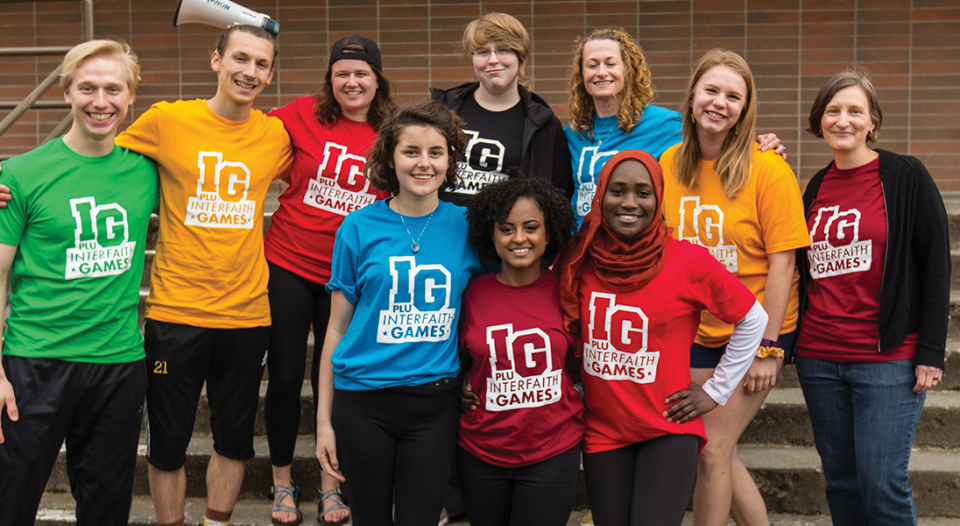Conversing across differences is a critical yet challenging skill for young people to develop. Through interreligious programming, Pacific Lutheran University (PLU) in Tacoma, Wash., hopes to help its students practice this skill in fun and meaningful ways.
“The framework of Lutheran higher education values critical questioning, learning in community, living lives of meaning and purpose in service to the common good, and caring for others,” said Jen Rude, university pastor at PLU. “All of these values point to the need for learning in diverse environments and the ability to engage across differences.
“It is critical that students have, as part of their liberal arts education, a basic knowledge of religious identities and how to respectfully interact with people of different faiths—especially in today’s political climate where some religions are misrepresented, scapegoated or feared.”
Joanna Royce-Davis, PLU vice president for student life, said interfaith work is “central to PLU’s Lutheran identity and, in particular, what it means to be both fully rooted and open. It is critical to living into PLU’s mission of care for individuals, communities and the earth.”
A new and innovative element of PLU’s programming is the Interfaith Games, which combines cooperative field games and friendly competition with intentional space for discussion about faith, spirituality and identity across religious traditions.
Participants from PLU’s student body, staff and faculty are divided into several diverse teams and engage in three rounds of games with guided discussion about faith identities and perspectives after each round. The event ends with a shared meal, providing further space for curiosity and conversation between participants.
“We offer games that are light and make folks laugh and work in community intentionally so that we can contribute to fostering a comfortable and safe environment for talking about something as sacred, and sometimes daunting, as faith and spirituality,” said Aziza Ahmed, a recent PLU graduate.
“Experiential learning is often more impactful than simply reading about a religious tradition.”
Ahmed served as the student interfaith worker on the campus ministry staff for two years and founded the Interfaith Games as a junior. Inspired by a similar program at the University of California, Davis, she worked with Rude and the student body vice president to create a fun and interactive way to build connections, have deeper conversations about faith and spirituality, and increase awareness for religious and interfaith groups on campus.
“As a first-generation Somali Muslim, I think this work is such a strong and multilayered tool for deepening students’ experience academically, personally, spiritually, socially and civically,” she said. “It teaches students and staff how to civically and meaningfully engage one another across faith and spirituality spectrums in the classroom as well as outside of it, maintains an inclusive campus for learning and aids in fulfilling PLU’s mission of care.”
Shannon Seidel, assistant professor of biology at PLU, participated in last year’s event. “To me, the games are one of the rare opportunities for students, staff and faculty to build community together on campus,” she said. “We are all around each other every day, but rarely do we have the opportunity to get to know one another in a deeper way and to begin to see the world through the eyes of someone with a very different experience than our own.”
Royce-Davis added, “The value of the games is the visible priority of interfaith learning that they communicate, the deep learning that occurs in a relatively short period of time, and the new and deepened relationships that develop as a result of participation.”
The school’s interreligious programming also features an interfaith-accessible Passover seder hosted by a local rabbi and partner chaplain at the university.
“Experiential learning is often more impactful than simply reading about a religious tradition,” Rude said. “The seder provides an embodied experience and the gift of being welcomed into a sacred ritual of a community. It deepens awareness and understanding and builds appreciation for another religious tradition.”
Rude also hosts a podcast called “Because We’re Lutheran” on which she and guests explore questions of identity, faith formation and Lutheran higher education from a variety of faith perspectives. The university hopes the podcast reaches students, alumni, ministry partners and neighbors.
“We wanted the podcast to highlight that we do interfaith [work] because we are Lutheran, not in spite of or as a side note,” she said. “Interfaith work is essential to our identity as a place of learning and a community that values diversity and inclusion and working together toward a more just world.”





